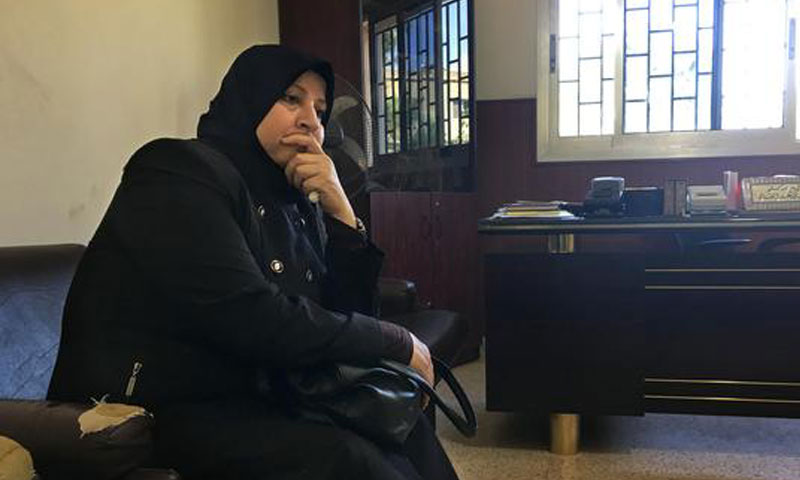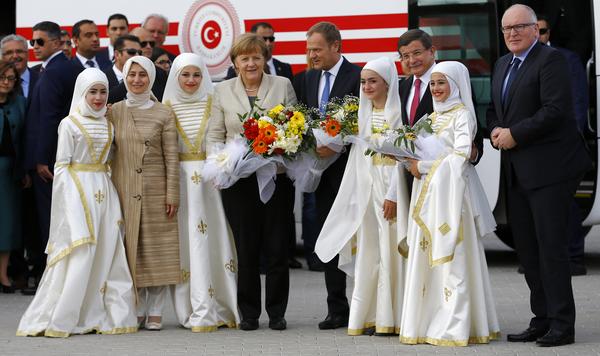Enab Baladi’s investigations team
From striving to preserve the residues of a love relationship which united Rawdah with her husband, to a desire to free herself from the burdens of a relationship that was not good enough to persist, the separation decision needed 11 years to be The war and its details have engendered the immediate causes of the divorce and made the separation inevitable.
Between the Syrian inside and the outside “she is neither waiting for her husband to come back, nor divorced”
” Misusing the Internet was the main cause of our divorce,” said activist Rawdah Mohammed Radwan to Enab Baladi, with confidence that is derived from a great conviction in her decision. She then recounts the rest of the story that was connected to revolutionary work and the impact of war and displacement. While telling her story, she talked about her strong personality and said that she is the “sister of men” and cannot be broken by fatigue.
Rawdah did not find the right time to solve the problems that resulted from her ex-husband’s misuse of the internet and meeting other women online. This is due to the lack of communication between the city of Saraqib, where she lived, and the city of Aleppo, where her husband lived during that period. When they met again, after two years, they found no way to bridge the deep gap between them.
“He left Syria and the revolutionary work, and went to Turkey. After a period of time, I left Syria too for security reasons. When I arrived to Turkey, I learned that he had married.” While Rawda has been able to cope with the problems and consequences of the distance between her and her husband, she was not prepared to accept the existence of a fellow-wife with whom she would share the man she loved.
The story of Rawdah, which details are presented in a video interview with Enab Baladi, is one among hundreds of stories of women whose life situations have changed as a result of the circumstances of war and displacement, and have therefore turned to divorced women. Even though the word no longer has the same old social effect, it certainly carries the troubles and hardships of women who were forced to endure the hardships of alienation on their own, and perhaps to support entire families.
Rania, 36, is a Damascus woman who lives in Istanbul and tries to find someone who would support her three children after her husband left her divorced and alienated in the city’s huge neighborhoods and returned to Syria where he established a new life and married another woman.
Rania, who refused to reveal her full name for personal reasons, says that the circumstances of alienation and the absence of her family’s support gave her ex-husband a space to behave in manners he would not have dared to practice in Damascus, including repeated cheating attempts and the desire to free himself from the burdens of supporting children and providing them with a decent life.
“He was always complaining about the lack of suitable job opportunities,forcing his 14-year-old daughter to work in a sewing workshop,” Rania tells Enab Baladi in scattered words, as she was trying to pump the pain of past years in one telephone conversation. Her appositive phrases reflect her extreme desire to convey her sufferance, to express the immense tragedy that befell her family, and to describe the days of homelessness and destitution she has experienced in Istanbul, and the huge resentment that her children have felt towards their father.
Like Rawdah, Rania was unable to obtain the civil divorce that is registered in the Syrian courts, due to the difficulty of the procedures of power of attorney in Turkey. Therefore, it was a verbal divorce, which made one of them “neither waiting for her husband to come back, nor divorced,” and consequently prevented her from the possiblility to get married again.
In Europe, Syrian women’s situation was not better than that in Turkey, where divorce between Syrians has significantly increased since 2015, along with high levels of asylum movement, and with the lack of statistics that might explain the situation in numbers. However, the activist who is interested in the refugees’ matters in Germany, Salem al-Ghanimi, confirmed to Enab Baladi that this phenomenon is widely spread. He rendered this to the laws that gave women a degree of freedom, along with the decline in the impact of customs and traditions as a result of the war.
However, for women who remained in Syria, the situation is different. Instead of struggling to seek their independence and get rid of previous burdens, they found themselves engulfed by war conditions and an increased effect of customs and traditions. This turned polygamy into an inevitable reality rather than an option. This is due to decreasing numbers of men in contrast to women, and the increasing number of widows after the death of more than 500 thousand people as a result of the war, a large proportion of whom are men.
Although the areas that are under the opposition factions’ control have witnessed more polygamy cases than the regime-controlled areas, the matter is associated with the increasing death rates and the bulk of Sharia fatwas that made polygamy an Islamic duty. However, the lack of civil records and adequate documentation led to the impossibility of counting these cases. In the regime-controlled areas, the polygamy cases have doubled six times between 2010 and 2015.
However ,Rawdah Mohammed Radwan confirms that even if she did not leave Syria, she would not have changed her decision, and she would not have accepted to be subjected to her relatives’ prejudices, who have always criticized her courage and strength and described her using adjectives often connected to divorced women in society. She believes that complete decisions are made based on what the heart wants and the reason directs to, unlike Rania, who believes that, , her life could have normally continued if there hadn’t been such asylum conditions.
The several divorce cases outside Syria, which are met with polygamous marriages inside Syria, is not the only occurring paradox in the Syrian society. During the seven years of war, divisions are more likely to occur in a society that cannot be homogenized again after its members have been dispersed in different regions.

A Syrian refugee in Lebanon is waiting in the Sunni Religious Supreme Court in Beqaa to decide on her divorce – August 2016 (Kristen Chick – The Washington Post)
“Fellow-wife” and “divorced woman”… the outcome of the Syrians’ confrontations with their society
In the midst of the contradictions that have surfaced in the Syrian society in all its factions over the past six years, polygamy and divorce cases are no longer offensive, in a society whose inherited customs and traditions have started to disappear due to the changes which involved conditions of displacement, asylum and security chaos, and madethe prohibited allowed and permitted when compared to murder and bloodshed.
Polygamy inside Syria and divorce outside it
The entry of a fellow-wife into the Syrian family was familiar, back in the beginning of the twentieth century, when a man used to marry a second woman for common reasons in a “masculine-biased” society. The most important reason was that his first wife was sterile, or she only gave birth to girls, or just because he was rich and what paved the way for a man to do so, was that his first wife had to forcibly accept that so as not to become divorced.
With the decline of this phenomenon at the end of the twentieth century, in Syrian cities, where women became more aware and daring to relatively express their opinion, the Syrian young woman no longer accepts to be a second wife, and no longer allows the existence of a fellow-wife in her house, consequently prefering to get divorced.
Some rural areas are excepted from this change, as they always seek, in a way or another, to preserve their social heritage, including polygamy and giving birth to many children, for considerations related to land ownership and relevance. Thus, the concept of “polygamy” has remained rooted in the origins of rural society.
On the other hand, the idea of divorce was and is still “rejected” in both civil and rural communities, which both hold women responsible for their divorce, claiming that she is “an immoral woman, if she was a good person, she would not have got her divorce.”
Since 2011, changing circumstances, caused by war, displacement, asylum and opening up to Western societies, have imposed urgent needs which turned things upside down and made polygamy inside Syria necessary despite the country’s economic and security instability.
According to marriages that are registered in the Islamic courts of Damascus, in 2015, polygamy have reached about 30% compared to only 5% in 2010, according to the first Sharia judge in Damascus, Mahmoud Maarrawi.
Nevertheless, divorce has become widespread among Syrians in the countries of asylum, far away from the eyes of the Syrian society, despite the economic and security stability the refugees have been experiencing, mainly in Europe, compared to Syrians at home.
There are no official statistics on the divorce rates among Syrians in the countries of asylum, because the phenomenon has recently emerged and it is mainly based on what is common among Syrians. In addition, divorce is normal and common in European societies that did not care about the spread of the phenomenon among the Syrians.
Polygamy as a way to confront spinsterhood
It is a common truth in the Syrian society that females have outnumbered males, whose number has been reduced due to death, detention, loss, immigration and joining compulsory service. Thus, the number of females exceeded 65% of all the society’s categories, according to what the first Sharia judge in Damascus, Mahmoud stated to Tishreen government newspaper, last February.
Marrying a second wife was one of the solutions that Maarrawi suggested to eliminate the phenomenon of spinsterhood, in conjunction with several calls by Syrian sheikhs in mosques and Jumu’ah prayer to urge men to marry other women.
The idea has spread in the society, despite the uproar it created, especially when, in order to persuade men to marry other women, the clerics used a Sharia rule which states that a second marriage becomes an “urgent need” in case of the spread of spinsterhood in the society, in order to prevent the spread of prostitution and to protect “forced” women from deviating from religion and habits.
Today, the Syrian girl accepts any husband who would provide her with enough financial support and would make her feel safe, although she would not have accepted him in normal conditions.
Sheikh Alaa Halwani, who lives Idlib, did not disagree with the opinion of the first Sharia judge, who believed that polygamy is one of the most effective ways to confront spinsterhood, according to what he stated to Enab Baladi.
Halwani added that the Prophet’s Sunnah “was not arbitrarily put”, and thanks to polygamy, the percentage of spinsterhood would “significantly decrease”.
From his part, Sheikh Mohammed Sobeih stressed to Enab Baladi the need for the aforementioned, saying that “the Muslim community eliminates spinsterhood, unlike other communities, where there are high rates of spinsterhood as a result of refusing marriage and engaging in illegal relations.”
Polygamy is a “humane motive”
Women-related social crises appeared to be the most widespread crises, since women are the most affected social categoryin the conflicts that have been taking place in Syria for more than six years. The death of more than half a million Syrians has widowed thousands of Syrian women and compelled them to face the life’s burdens on their own, in midst of a huge controversy on finding a solution for them.
Here, clerics’ role has emerged in urging the marriage from widowed women, the martyrs’ wives and mothers of orphans who need financial support, not from young girls. Thus, from the point of view of clerics, the second marriage would solve two problems, namely high rates of spinsterhood and the increasing number of widows.
Sheikh Alaa Halwani pointed out that the common second marriages in Syria are those from widows, in order to “cover them up and adopt their orphans.” He continued, “I met many of those who seek to marry a second woman in accordance with the Messenger of Allah’s sunnah. In addition, men have a humane motive to marry the martyrs’ widows in particular, in order to provide them with a safe life and raise their children.”
Concerning the economic conditions because of which the Syrian young men refused to marry other women, because they are unable to take responsibility for one the family, let alone two! Sheikh Halwani said there was no significant impact on the financial situation on polygamous marriages.
He continued “Whoever has the goal of doing good and certainly following the Sunnah, God will facilitate things for him, although he would face some financial difficulties, but not at a large scale.”
However, Sheikh Mohammed Sobeih had another opinion. He considered that in case the man did not enjoy financial abilities his second marriage “is Haram (forbidden) by Sharia law”, but in case he did, marriage becomes a “duty”. He explained that “it would be unjust if the husband is unable to financially support the second wife and secure a decent life for her. Therefore, Sharia law defines this marriage to be Haram.”
Sobeih recommended financially-stablemen to initiate a second marriage so that they can help solving the spinsterhood problem “in a society where widows and females are commonly widespread.”
Divorcing towards “Liberation” in spite of “Stability”
In many countries around the world, the lives of Syrian refugees have been subject to necessary changes as a natural result of the integration attempt imposed by some societies, especially the European ones, as the number of Syrian refugees has exceeded five million. About half a million of them went to EU countries.
Perhaps the most prominent thing that has been circulating about the lives of refugees in Europe is the widespread divorce in an unprecedented way the Syrians have never witnessed in their conservative society, from which restrictions they broke free in more open civil societies.
Although Syrian women have become relatively more aware in recent years of their right to get divorce from their husbands and defying societies’ “humiliating” views, the reasons and separation conditions have differed between Syria and Europe according to the different societies and their laws.
Salem al-Ghunaimi, a student of sociology and a researcher on refugee issues in Germany, stressed the spread of divorce phenomenon among Syrians in Europe, pointing out to Enab Baladi that the official statistics are unavailable because this issue is brand new.
Al-Ghunaimi said that the Syrian wife in Europe is often the one who asks for divorce, being sure that the German law will side with her and protect her and her children. It is also the same thing that made her unable to bear her husband traits, which she had to remain silent about for years under Syrian law.
Here, the Syrian woman found herself free from the accusing gazes of the people in her society, which forced her to endure the “injustice” of her husband in order to avoid the title of “a divorcée”, which would hunt chase her and her children as a disgrace. The social researcher considered this as “positive” for the benefit of Syrian women.
The facilities offered by European governments to divorced women played a role in the separation decision. The State would provide education for children, pay wages and the cost of living if the wife was unable to work.
However, women’s desire to liberate themselves requires their great awareness so as not to lag behind emancipation trends that led to the disintegration of family ties among Syrians, simply because of the couple’s desire to break free from family restrictions and to integrate into the European society, which is based on extramarital relations.
On the other hand, al-Ghunaimi attributed the causes of divorce in Europe to the “Eastern man”’s way of thinking, which the Syrian husband has brought with him to a society where women’s and men’s rights are equal. He called on the refugees to get rid of that mentality as long as it did not go beyond the limits of “doing wrong”.
European governments sought to encourage refugee women to divorce, by questioning the wife whether she was comfortable with her husband and whether he was hitting her or not. However, the researcher on refugees’ affairs told Enab Baladi that this questioning only occurs in case the hosting countries noticed the large age gap between the couple, which is common in Syria, or that the husband is religiously strict.
Polygamy Rules in Islam and Divorce in European laws
Islam allows the Muslim man to marry four women, according to the Quranic verse “if you fear that you shall not be able to deal justly with the orphans, marry women of your choice, two or three or four; but if you fear that you shall not be able to deal justly (with them), then only one, or (a captive) that your right hands possess, that will be more suitable, to prevent you from doing injustice.”
Polygamy is Halal but not an Obligation
Scholars confirm that the previous verse provides “permissibility” rather than “obligation”. Islam also restricts polygamous marriage with a number of conditions, the most important of which are the husband physical and financial capabilities, in addition to establishing justice between the wives in terms of housing, expenditures and the amount of time the husband dedicates to his wife.
The Syrian law allows a man to marry four women. Since the Personal Status Law for Muslims in Syria, which governs divorce, marriage, separation and custody, is derived from the provisions of Islamic law. Other religions have their own courts.
Article 17 of the Syrian Personal Status Law states that “the judge shall not allow a married person to marry for the second time unless he has a legitimate justification and the husband is able to support both of his wives financially.”
However, the law itself began to tolerate the issue of marrying the second wife in the aftermath of the spread of spinsterhood in society, according to the first legal judge in Damascus, Mahmoud Maarrawi.
He pointed out that “in the past, the second marriage required the judge to ascertain the husband’s financial solvency and make sure of his ability to bear the burden of the two families expenses, in addition to the significant age gap between the husband and the second wife, which should not be large.
In an interview with governmental newspaper Tishreen, Maarrawi stated that “we are no longer examining the terms of a man’s second marriage. These conditions began to be applied on the third marriage too, which represent only few cases.”
However, the Syrian lawyer Ahlam Ibrahim, who lives in Turkey, told Enab Baladi that this law was never implemented before 2011 and the widespread of spinsterhood. Judges often approve the second marriage without checking the husband’s solvency and financial ability.
Facilities for Separation in Europe
Syrian law differs from other European laws, which are based on the separation between religion, politics and law. These laws are often seen as “fair” to women, while some accuse them of facilitating the disintegration of family and society.
With the widespread of Syrians’ divorce in Europe and specifically in Germany, some girls took advantage of the law that supports the right of women to divorce without the consent of their husbands and guarantees their financial independence from housing and education of children and the cost of living.
Unlike the Syrian law which does not provide these facilities only in case the husband approved of the divorce.
The European law is clear and explicit concerning this subject. The husband cannot control his wife, or force her to live with him, or treat her in a humiliating and undignified manner, except for the possibility of putting a man in prison if he beats his wife.
Article 1 of German Protection against Violence Act dictates that a husband is banned from physically or psychologically abusing his wife or to restrict her freedom or even to threaten her.
However, the laws in the Arab countries consider that the family is the basis of society, so they are keen on protecting it from disintegration and keeping it united as much as possible.
How does Syrian Community perceive Polygamy and divorce?
Single Men should marry
Enab Baladi conducted an opinion poll in the city of Idlib and Hama countryside about the Syrians’ view of the phenomenon of polygamy at home and divorce abroad.
Mohammed al-Sayyid, a farmer from Binnish, said that polygamous marriages are in accordance with the requirements of society. He pointed out that in case polygamy was implemented to solve the problem of the increasing number of widows, it is then considered as primarily humane. If he was willing to marry her in order to protect her and her children then marriage becomes a necessity. ”
However, Mohammed pointed out the existence of cases of older men marriage from relatively young girls, considering that marriage in this case is a “pleasure for the soul.” He stated that “what this man is speaking about as applying Sunnah is nothing but fake justifications he provides to others.”
Reza al-Homsi, who works in computers maintenance in Idlib, rejected the idea of polygamy, considering it as “wrong” in light of the low living conditions and state of war the Syrians are experiencing. “I do not like polygamous marriages because of the problems and pressure put on men.”
However, the teacher Khalil al-Kilani, from the city of Hama, called rich men to help young people who are unable to afford marriage expenses. “There are many young people who are seeking to marry for the first time, and it is better to help them get married rather than allowing another married man to marry for the second time.”
In Hama countryside, most of those who were subject to this poll agreed on the need for polygamy to eliminate spinsterhood, which could open the door toward the spread of “moral decay” in Syrian society, especially as the number of widows who may be forced to “delinquency” in order to bear the burden of life, is increasing. They believe Sharia has found a solution for this problem through polygamy.
However, during some previously conducted polls by a number of local media outlets, women showed a completely different reaction. Although many women stood for the defense of polygamy, the majority rejected it and even threatened to divorce her husband or take revenge.
Some women called men to make sure whether they want to marry for the second time, so that women would make their own decision, while some others were not interested and showed an indifference to what their husbands might do.
Others women questioned men’s need for a second marriage in light of the deteriorating economic situation, which is affecting society in general and making families unable to secure a stable life with a single wife.
Those who were subject to the polls in Hama countryside attributed divorce in Europe to the different European societies, which the Syrian refugees were forced to integrate in and which are also considered as “more open-minded and freer” than our Syrian society.
One of those who were subject to the poll suggested that European laws which are favouring women encourage the Syrian wife to ask for divorce and side away from inherited social customs.
Split over causes Identification
In a poll conducted by Enab Baladi on its website, , the participants’ provided divergent points of view about the two issues, which are affecting the Syrian society. The results showed close percentages in the answers to the question: “In your opinion, what is the cause of polygamy in Syria?”
47 per cent of those who responded to the poll and whose number is 310 rendered the phenomenon to the increasing number of widows in Syria as a result of the conflict. Polygamy supporters consider it as the best solution in a conservative society that would protect women and prevent them from “moral decay”.
35 per cent of them attributed this to the high rate of spinsterhood in Syria, criticizing the circumstances of the arrest of Syrian youth, migration and killing, which contributed to the rise of the proportion of females in Syrian society to reach 65 per cent.
The lowest percentage, which represents 18 per cent, attributed the prevalence of this issue to clergy men’s calls to encourage men to consider what they see as “saving society” from ethilc problems, which could lead to its collapse, through marrying for the second or even third time.
However, the divergence in opinions was clearer in determining the reasons behind the spread of divorce among Syrians abroad. The results showed close proportions in response to the question: “In your opinion, why is divorce between Syrians increasing in asylum countries?”
Another 36 per cent of those who responded to the poll considered that the reason behind this issue is one of the couple’s desire to break free from family restrictions and to integrate into the new society, while 33 per cent of them attributed this to the decline of Syrian society’s pressure and restrictions, which rejects the idea of divorce.
Another 31 per cent stated laws that are pro-women in some asylum countries, especially European, contributed to encouraging women to “break free” from their husbands who “control them” amid contrasting opinions between the positive and the negative impact.
if you think the article contain wrong information or you have additional details Send Correction
النسخة العربية من المقال
-
Follow us :
Most viewed
- Potential Erdoğan-Assad meeting in Moscow: Talks of excluding Iran
- European countries call for re-evaluation of policy towards Syria
- Syria’s People's Assembly elections: "Decoration" and messages to the outside
- Syrian organizations hold Europe responsible for violations of refugees' rights in Turkey
- Al-Assad and Erdoğan show flexibility regarding a possible meeting.. Expected Arab role


















 A
A
A
A
A
A









 More In-Depth
More In-Depth